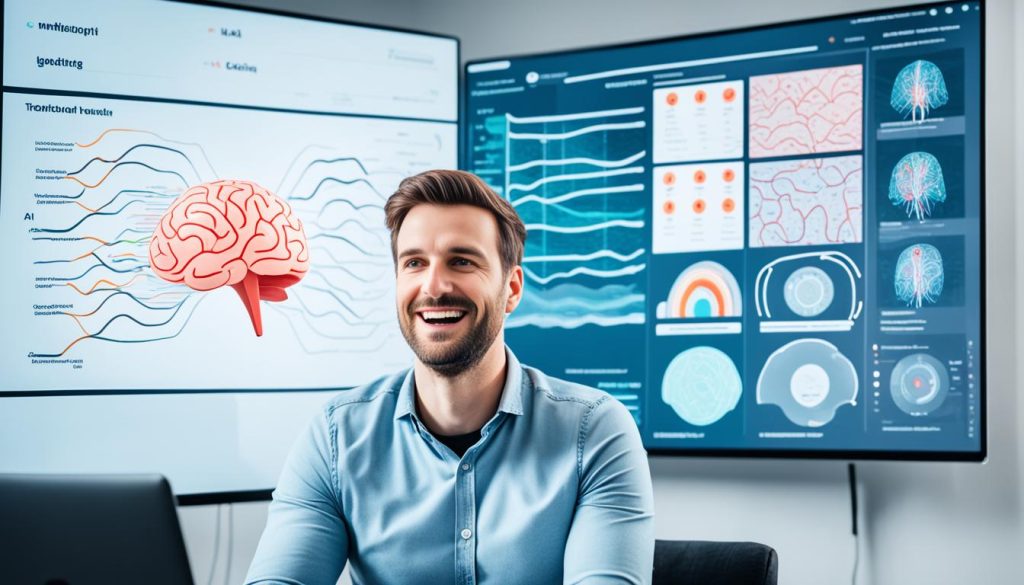Artificial Intelligence (AI) is changing many parts of our lives. Its effect on mental health and wellbeing is especially interesting. AI uses natural language processing, machine learning, and deep neural networks in many ways to help mental health care.
It can spot mental health issues early and help diagnose them. AI can also create chatbots and virtual assistants. These tools are set to change how we get mental health help.
Key Takeaways
- AI can play a crucial role in early detection and diagnosis of mental health disorders through advanced analytics and pattern recognition.
- AI-powered chatbots and virtual assistants are improving access to mental health support, especially for individuals with limited access to traditional care.
- Sentiment analysis and text classification techniques in AI can be leveraged to enhance suicide prevention efforts.
- AI has the potential to address health disparities and improve accessibility to mental health services by overcoming geographic, socioeconomic, and cultural barriers.
- Responsible development and deployment of AI in mental health care are essential to ensure privacy, ethical considerations, and equitable access.
The Growing Burden of Mental Health Disorders
Mental health disorders are now a major global concern. They affect individuals, communities, and economies worldwide. The Global Burden of Disease Study 2019 found that 1 billion people had mental health disorders in 2019. This makes mental health a top cause of disability worldwide.
Global Prevalence and Economic Impact
Depression is now the leading cause of disability globally. It affects millions worldwide. The economic impact is huge too. In the UK, mental health issues cost about £117.9 billion a year, which is 5% of the GDP.
This cost isn’t just in healthcare. It also includes lost productivity, absenteeism, and other economic losses. Mental health disorders pose a big challenge for health systems and policymakers globally.
We need strong, evidence-based strategies to tackle this global health crisis. It’s vital to focus on prevention, early intervention, and making treatment accessible. This will help reduce the effects of mental health issues and protect individuals and communities.
AI for Early Detection and Diagnosis
AI and machine learning are changing how we spot mental health issues early. They help find patterns that lead to early detection of conditions like depression, Alzheimer’s disease, and schizophrenia.
Tools powered by natural language processing and sentiment analysis look at many kinds of data. This includes clinical records, social media, and wearable devices. They spot changes in language and behavior early, helping doctors catch mental health problems quickly.
Spotting mental health issues early is key. It means people can get help before things get worse. AI and machine learning are big helps here. They help doctors make better choices and give patients the best care.
With deep learning, AI is getting even better at helping with mental health. It uses lots of data and machine learning to give doctors new insights. This leads to better diagnoses and helps patients feel better overall.
AI-powered Chatbots and Virtual Assistants
AI-powered chatbots and virtual assistants are changing mental health care. They use big data and natural language processing to act like humans. This helps people get the support they need for their mental health.
Improving Access to Mental Health Support
AI chatbots and virtual assistants make mental health services easier to get, especially for those in remote areas. They cut down the need for in-person visits. This means people can get help without worrying about where they live.
People like using conversational AI for mental health because it’s supportive and doesn’t judge. Healthcare providers see the value in these tools too. They use them to help patients at all stages of their mental health journey.
- AI chatbots are always there, offering a safe place to talk about mental health issues at any time.
- Virtual assistants help with self-care, give personalized advice, and connect people with the right mental health services.
- These AI systems can spot mental health issues early, helping to prevent them from getting worse.
The need for easy and affordable mental health support is growing. Adding AI chatbots and virtual assistants to healthcare is a big step forward. It makes mental health services better and helps people feel better overall.
AI and Suicide Prevention
Suicide is a huge concern for mental health, and AI is now a key tool to fight it. AI uses advanced methods to look at many factors to find patterns linked to suicide.
AI tools look deeper into mental health than old methods. They check many things, like how someone feels and if they have reasons to keep living. This helps AI guide help and support for those in crisis.
AI systems are quick, easy, and open to all. They offer support and help in crisis, giving hope to those who need it. With more people facing mental health issues, AI’s role in preventing suicide is very promising.
AI-Powered Suicide Risk Assessment
AI is key in suicide prevention because it can look at lots of data to spot risks. These tools consider many factors, such as:
- Demographic information
- Mental health history
- Behavioral indicators
- Social determinants of health
- Environmental factors
By looking at these factors, AI gives a detailed view of someone’s suicide risk. This helps doctors and mental health workers help more effectively.

Adding AI to suicide prevention is a big step forward. It could save lives and offer support to those with mental health issues. As AI gets better, it could change the future for the better, making sure no one feels alone.
AI
AI is changing fast, and healthcare workers like mental health experts, nurse informaticists, and engineers must work together. They need to understand how to build, use, and work with AI in mental health care. Researchers looked into what psychiatrists think about AI and machine learning’s effects on mental health services. They found that people from different cultures see how AI could change the way we talk about mental health. But, they also worry about the ethical and legal sides of using AI.
A study in the Journal of Medical Internet Research looked at what US and Indian psychiatrists think about AI in mental health care. The study showed that doctors see AI as a way to catch mental health issues early and help more people. Yet, they worry about the ethics and the need for strong rules and checks.
Doctors in both countries stressed the need to keep patient info private with AI tools. They also talked about the risks of AI making wrong diagnoses or giving bad advice. They worry about AI being biased and not helping everyone equally, based on their background.
As AI and ML become more part of mental health care, we all need to keep talking about the big issues. By working together, we can make sure AI helps patients safely and fairly. This way, we can use AI’s power for good, keeping patients’ privacy and well-being in mind.
Challenges and Limitations of AI in Mental Health
AI has a lot of potential to change mental health care. But, there are big challenges and limits that need to be looked at. As AI becomes more common in mental health, researchers point out important issues that need thought.
One big issue is the ethics of using AI in mental health. Questions come up about keeping data private, making AI systems accountable, and avoiding biases that could make health care worse for some people. It’s key to use AI in a way that respects everyone’s privacy and needs.
There are also worries about data privacy. Mental health data is very personal. There are concerns about how it’s collected, stored, and used. AI systems must be made to keep patient info safe and private.
Looking into the regulatory and legal implications of AI in mental health is also important. Rules and guidelines need to be set to make sure AI is used right. This protects patients’ rights and deals with questions of who is responsible.
Lastly, we can’t forget the limits of AI algorithms when dealing with complex mental health issues. AI tools can help spot problems early and diagnose them. But, they might not fully understand the complex nature of mental health.
As we keep using AI in mental health, we must tackle these challenges. We need ongoing research, careful thinking, and teamwork between AI experts, mental health professionals, and policymakers. This will help make sure AI is used in a way that helps people and respects their privacy.
AI and Health Disparities
AI is changing mental health care fast. It can help fix long-standing issues of health gaps and getting to care. By using online and mobile tools, AI can reach more people. This helps those who couldn’t get care before.
AI helps mental health care reach far-off places easily. AI-powered chatbots and virtual assistants make it easy for people to get help. No matter where they live or their financial situation.
Addressing Accessibility and Equity
But, just having AI isn’t enough. We must make sure it really helps everyone. This means making sure AI mental health tools work for all people. It’s about:
- Ensuring the diversity and representation of the target population in the design and testing of AI-based mental health tools
- Addressing language and cultural barriers to improve accessibility for marginalized communities
- Implementing strategies to make these technologies affordable and accessible to individuals from low-income backgrounds
- Collaborating with community-based organizations and healthcare providers to integrate AI-powered solutions into existing mental health infrastructure
By focusing on accessibility and equity, we can use AI to close the gap in mental health care. This way, everyone can get the support they need.
The Future of AI in Mental Health Care
AI is getting better and could change how we handle mental health care a lot. Experts think AI tools will get smarter. They will help with personalized, data-driven approaches to check, diagnose, and treat mental health issues.
AI could really help mental health care in the future. It might lead to new ways to help people, make treatments better, and reach more people who need help. But, we need to work together. We need healthcare workers, tech experts, and leaders to make sure it’s done right and fair.
Here are some ways AI could change mental health care:
- AI could spot mental health problems early by looking at data from social media, fitness trackers, and medical records.
- It could make treatment plans that fit each person’s unique needs, making treatments more effective.
- It could keep an eye on patients and give feedback in real time, helping doctors make changes to help patients get better faster.
- AI could make mental health help more available, especially in places that don’t have enough resources.
- It could use data to predict when someone might have a mental health crisis, so we can help them before it happens.

But, the future of AI in mental health isn’t all good news. It will also bring challenges and things to think about. We need to make sure AI is used in a responsible way. This will help us use its power to make people and communities healthier.
Conclusion
Artificial intelligence is changing how we handle mental health and wellbeing. It helps with early detection, making treatment plans, and getting more people care. AI is already making a big difference in mental health.
The need for mental health care is growing worldwide. Using AI in mental health could be key to tackling this issue. But, we must make sure AI is used right, fairly, and helps everyone.
AI has a bright future in mental health care. We need to work together, though. Healthcare workers, tech experts, and leaders must join forces. With AI, we can make mental health and wellbeing a top priority. Everyone will get the support they need to do well.